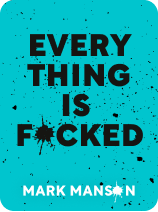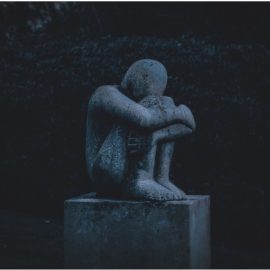

This article is an excerpt from the Shortform book guide to "Everything Is F*cked" by Mark Manson. Shortform has the world's best summaries and analyses of books you should be reading.
Like this article? Sign up for a free trial here.
What’s Mark Manson’s view on happiness? What’s the relationship between happiness and hope?
According to Mark Manson, happiness is becoming less meaningful and more elusive. He blames it on an epidemic of hopelessness. However, he argues that hope can lead to harm, so it’s essential to learn how to live a fulfilling life without hope for the future.
Read on to learn more about Mark Manson’s views on happiness and living a life without hope.
Mark Manson on Happiness & Hope
Although our living conditions are generally better than they’ve ever been, statistics show that people are getting steadily unhappier. According to self-help author Mark Manson, happiness is at an all-time low in society due to widespread hopelessness: People no longer feel like they can help create a better future. The solution to this problem is complicated—Manson argues that the hope that makes us feel fulfilled also leads us to harm ourselves and others. Thus, we must learn to live a fulfilling life without hope for a better future.
(Shortform note: Mark Manson cites many sources showing that people in wealthy countries are getting unhappier, supporting his argument that high standards of living aren’t the key to happiness. However, there’s less research to back up his assertion that this mental health crisis is due to a lack of hope, and many experts offer other theories. For example, some theorize that people are unhappier in wealthier countries because they’re surrounded by more wealthy people to compare themselves with. The resulting feelings of inadequacy could contribute to anxiety and depression. There’s some evidence supporting this theory: Within the US, where many wealthy people live, people with a lower income are the most at risk of suicide.)
Hope Cannot Promise Everlasting Happiness
Mark Manson argues that unfortunately, the hope you get from an ideology won’t bring you lasting happiness. No ideology can always deliver on its promise of a less painful future because life is, and always will be, painful. This is true on a biological level: No matter what your external circumstances are in life, your brain will always settle into a state of dissatisfaction. This is what helps us survive—evolutionarily, constant dissatisfaction is what motivates us to keep engaging in productive action.
(Shortform note: This view on happiness, suffering, and ideology is one of the main points in Mark Manson’s first book, The Subtle Art of Not Giving a F*ck. In Subtle Art, Manson elaborates that although we’re evolutionarily destined to always be dissatisfied, we’re also predisposed to find the process of improvement intrinsically satisfying. In other words, although you’ll always face problems in life, continually solving those problems can help you find happiness. This explanation of how hope can make a painful life feel satisfying is more specific than the one Manson offers in Everything Is F*cked.)
While many ideologies successfully help people improve their lives, no ideology can continue to improve your life indefinitely, giving you a perfect, painless life. This is disastrous because when an ideology can no longer give you a better future, it can no longer be a source of hope.
What Happens When Our Ideology Fails?
According to Mark Manson, when an ideology fails to bring us happiness or eliminate the pain it promises, we can react in a couple of different ways. First, we could abandon the ideology entirely, which Manson argues would be best. Unfortunately, people rarely blame the ideologies for the pain they feel, because the ideologies have provided the hope and meaning driving their life for years.
People following an ideology that makes them unhappy often blame themselves rather than the ideology, argues Manson. Instead of rejecting their ideology’s primary virtue, they preserve their sense of hope by accusing themselves of failing to adhere to that virtue strongly enough. In this way, hoping for a better future causes you to suffer: When a better future doesn’t arrive, it makes you feel worse about yourself.
For example, imagine that someone buys a new video game that gives them a feeling of hope in life. They adopt success in that video game as their primary virtue and spend all their time playing with other gamers who are just as obsessed with winning in that game. This gamer feels proud and validated every time they rise on the game’s online leaderboard until they’re one of the top 1,000 players in the world. Then, without the ability to improve their skills more, they lose the pleasure of progress. However, instead of abandoning the ideology of virtual domination and quitting the game to find something more fulfilling to do, they emotionally punish themselves for failing to get better at the game, falling into a state of perpetual suffering.
| Ideological Disappointment in Romantic Relationships Often, these same dynamics play out in toxic relationships. In Getting the Love You Want, Harville Hendrix and Helen LaKelly Hunt explain that the personality type you’re attracted to is based on an idealized version of your caregivers from childhood. For this reason, when you fall in love with someone, you’re likely to see them as a perfect source of love, overlooking their flaws. This causes you to falsely believe that investing in this person will result in a painless future—a perfect “happily ever after.” In this way, romantic relationships are two-person ideologies in which one becomes the other’s primary virtue and source of hope (Mark Manson explicitly acknowledges this view on happiness in relationships in his book). However, at a certain point, as the chemical rush of new love wears off and your partner’s flaws become impossible to ignore, they no longer give you the hope of a perfect future. Just as in broader ideologies, this may cause you to blame yourself rather than the other person or the relationship itself. This is particularly common among those with an anxious attachment style, who habitually idolize their partner and demean themselves. People with an anxious attachment style are unlikely to abandon the “ideology” of their relationship and find a new one because they see the relationship as vital to their well-being—in other words, it has been one of their main sources of hope. If the anxious attacher continues to believe that they’re responsible for all the relationship’s flaws instead of appropriately holding their partner accountable and finding someone better, they’ll continue to seek love and validation from someone who will never fully give it to them, trapping themselves in a miserable relationship. To avoid getting stuck in this kind of romantic relationship, communicate your needs directly so that compatible partners know how they can support you. Further, promise yourself that you’ll break up with anyone who isn’t invested in helping you fulfill those needs—this mirrors Manson’s advice to abandon ideologies that no longer serve you. Remind yourself that there are plenty of wonderful potential romantic partners in the world, so there’s no need to cling desperately to one who’s treating you poorly. |

———End of Preview———
Like what you just read? Read the rest of the world's best book summary and analysis of Mark Manson's "Everything Is F*cked" at Shortform.
Here's what you'll find in our full Everything Is F*cked summary:
- How the hopelessness epidemic is affecting society
- Why you must abandon hope in order to live a fulfilling life
- How to practice a life without hope and instead, find meaning






